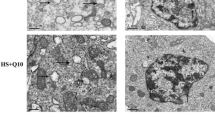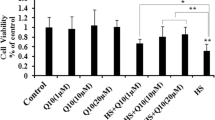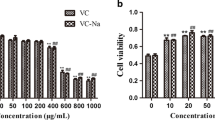Abstract
We investigated the effects of co-enzyme Q10 (Q10) and acetyl salicylic acid (ASA) on expression of Hsp70 in the protection of primary chicken myocardial cells during heat stress. Western blot analysis showed that Q10 and ASA accelerated the induction of Hsp70 when chicken myocardial cells were exposed to hyperthermia. In the absence of heat stress, however, neither Q10 nor ASA are able to upregulate Hsp70 expression. Analysis of enzymes that respond to cellular damage and pathological examination revealed that ectopic expression of ASA and Q10 alleviate cellular damage during heat stress. Quantification of heat shock factors (HSF) indicated that treatment of ASA increased the expression of HSF-1 and HSF-3 during heat stress. Treatment with Q10 resulted in the elevation of HSF-1 expression. Expression of HSF-2 and HSF-4 was not affected by ASA or Q10. Subcellular distribution analysis of HSF-1 and HSF-3 showed that in response to heat stress ASA promoted nuclear translocation of HSF-1 and HSF-3, while Q10 promoted only HSF-1 nuclear translocation. Chromatin immunoprecipitation (ChIP) analysis indicated that HSF-1 occupies the Hsp70 promoter in chicken primary myocardial cells during heat stress and under normal conditions, while HSF-3 occupies the Hsp70 promoter only during heat stress. Real-time PCR analysis revealed that ASA induces HSF-1 and HSF-3 binding to Hsp70 HSE, while Q10 only induces HSF1 binding to Hsp70 HSE, in agreement with the impact of HSF1 and HSF3 silencing on Hsp70 expression. These data demonstrate that ASA and Q10 both induce the expression of Hsp70 to protect chicken primary myocardial cells during heat stress, but through distinct pathways.










Similar content being viewed by others
Change history
27 September 2019
In the original publication of the article, one of the images was selected by mistake in Fig.��3 (HS���+���ASA, 5��h). The correct version of Fig.��3 is given in this correction.
27 September 2019
In the original publication of the article, one of the images was selected by mistake in Fig.��3 (HS���+���ASA, 5��h). The correct version of Fig.��3 is given in this correction.
References
Li Z, Srivastava P (2004) Heat shock proteins. Curr Protoc Immunol. doi:10.1002/0471142735.ima01ts58
Clarke AR (1996) Molecular chaperones in protein folding and translocation. Curr Opin Struct Biol 6:43–50
Young JC (2010) Mechanisms of the Hsp70 chaperone system. Biochem Cell Biol 88:291–300. doi:10.1139/o09-175
Bao ED, Sultan KR, Nowak B, Hartung J (2008) Expression and distribution of heat shock proteins in the heart of transported pigs. Cell Stress Chaperones 13:459–466. doi:10.1007/s12192-008-0042-4
Cheng YF, Sun JR, Chen HB, Abdelnasir A, Tang S, Kemper N, Hartung J, Bao ED (2014) Association of Hsp60 expression with damage to rat myocardial cells exposed to heat stress in vivo and in vitro. Genet Mol Res 13:9371–9381. doi:10.4238/2014.November.11.3
Chen HB, Zhang XC, Cheng YF, Abdelnasir A, Tang S, Kemper N, Hartung J, Bao ED (2015) Association of heat shock protein 70 expression with rat myocardial cell damage during heat stress in vitro and in vivo. Genet Mol Res 14:1994–2005. doi:10.4238/2015.March.20.9
Zhang XH, Zhu HS, Qian Z, Tang S, Wu D, Kemper N, Hartung J, Bao ED (2016) The association of Hsp90 expression induced by aspirin with anti-stress damage in chicken myocardial cells. J Vet Sci 17:35–44. doi:10.4142/jvs.2016.17.1.35
Mehta SL, Manhas N, Raqhubir R (2007) Molecular targets in cerebral ischemia for developing novel therapeutics. Brain Res Rev 54:34–66. doi:10.1016/j.brainresrev.2006.11.003
Vanlangenakker N, Vanden Berghe T, Krysko DV, Festjens N, Vandenabeele P (2008) Molecular mechanisms and pathophysiology of necrotic cell death. Curr Mol Med 8:207–220
Kalmar B, Greensmith L (2009) Induction of heat shock proteins for protection against oxidative stress. Adv Drug Deliv Rev 61:310–318. doi:10.1016/j.addr.2009.02.003
Li CY, Lee JS, Ko YG, Kim JI, Seo JS (2000) Heat shock protein 70 inhibits apoptosis downstream of cytochrome c release and upstream of caspase-3 activation. J Bio Chem 18:25665–25671. doi:10.1074/jbc.M906383199
Saleh A, Srinivasula SM, Balkir L, Robbins PD, Alnemri ES (2000) Negative regulation of the Apaf-1 apoptosome by Hsp70. Nat Cell Biol 2:476–483. doi:10.1038/35019510
Hebert PR, Hennekens CH (2000) An overview of the four randomized trials of aspirin therapy in the primary prevention of vascular disease. Arch Intern Med 160:3123–3127
Kubota N, Kasai T, Miyauchi K, Njaman W, Kajimoto K, Akimoto Y, Kojima T, Ken Y, Takeshi K, Hiroyuki D (2008) Therapy with statins and aspirin enhances long-term outcome of percutaneous coronary intervention. Heart Vessel 23:35–39. doi:10.1007/s00380-007-1007-8
Wu D, Xu J, Song EB, Tang S, Zhang XH, Kemper N, Hartung J, Bao ED (2015) Acetyl salicylic acid protected against heat stress damage in chicken myocardial cells and may associate with induced Hsp27 expression. Cell Stress Chaperones 20:687–696. doi:10.1007/s12192-015-0596-x
Wu D, Zhang M, Xu J, Song EB, Lv YJ, Tang S, Zhang XH, Kemper N, Hartung J, Bao ED (2016) In vitro evaluation of aspirin-induced HspB1 against heat stress damage in chicken myocardial cells. Cell Stress Chaperones 21:405–413. doi:10.1007/s12192-016-0666-8
Wu D, Zhang M, Lv YJ, Tang S, Kemper N, Hartung J, Bao ED (2016) Aspirin-induced heat stress resistance in chicken myocardial cells can be suppressed by BAPTA-AM in vitro. Cell Stress Chaperones 21:817–827. doi:10.1007/s12192-016-0706-4
Kędziora-Kornatowska Czuczejko J, Motyl J, Szewczyk-Golec K, Kozakiewicz M, Pawluk H, Kedziora J, Blaszczak R, Rysz J (2010) Effects of coenzyme Q10 supplementation on activities of selected antioxidative enzymes and lipid peroxidation in hypertensive patients treated with indapamide. A pilot study. Arch Med Sci 30:513–518. doi:10.5114/aoms.2010.14461
Yokoyama K, Nakamura K, Kimura M, Nomoto K, Itoman M (1999) Effect of coenzyme Q10 on superoxide production in rats with reperfusion injuries. Scand J Plast Reconstr Surq Hand Surq 33:1–5
Fotino AD, Thompson-Paul AM, Bazzano LA (2013) Effect of coenzyme Q10 supplementation on heart failure: a meta-analysis. Am J Clin Nutr 97:268–275. doi:10.3945/ajcn.112.040741
Tang S, Yin B, Song EB, Cheng HB, Cheng YF, Zhang XH, Bao ED, Hartung J (2016) Aspirin upregulates αB-Crystallin to protect the myocardium against heat stress in broiler chickens. Sci Rep 6:37273. doi:10.1038/srep37273
Zhang XH, Qian Z, Zhu HS, Tang S, Wu D, Zhang M, Kemper N, Hartung J, Bao ED (2016) HSP90 gene expression induced by aspirin is associated with damage remission in a chicken myocardial cell culture exposed to heat stress. Br Poult Sci 57:462–473. doi:10.1080/00071668.2016.1174978
Xu J, Tang S, Song EB, Yin B, Wu D, Bao ED (2016) Hsp70 Expression induced by co-enzyme Q10 protected chicken myocardial cells from damage and apoptosis under in vitro heat stress. Poult Sci. doi:10.3382/ps/pew402
Nakai A (1999) New aspects in the vertebrate heat shock factor system: Hsf3 and Hsf4. Cell Stress Chaperones 4:86–93
Pirkkala L, Nykanen P, Sistonen L (2001) Roles of the heat shock transcription factors in regulation of the heat shock response and beyond. FASEB J 15:1118–1131. doi:10.1096/fj00-0294rev
Morano KA, Thiele DJ (1999) Heat shock factor function and regulation in response to cellular stress, growth, and differentiation signals. Gene Expr 7:271–282
Bjork JK, Sistonen L (2010) Regulation of the members of the mammalian heat shock factor family. FEBS J 277:4126–4139
Nakai A, Ishikawa T (2001) Cell cycle transition under stress conditions controlled by vertebrate heat shock factors. EMBO J 20:2885–2895. doi:10.1093/emboj/20.11.2885
Inouye S, Katsuki K, Izu H, Fujimoto M, Sugahara K, Yamada S, Shinkai Y, Oka Y, Katoh Y, Nakai A (2003) Activation of heat shock genes is not necessary for protection by heat shock transcription factor 1 against cell death due to a single exposure to high temperatures. Mol Cell Biol 23:5882–5895. doi:10.1128/MCB.23.16.5882-5895.2003
Tanabe M, Kawazoe Y, Takeda S, Morimoto RI, Nagata K, Nakai A (1998) Disruption of the HSF3 gene results in the severe reduction of heat shock gene expression and loss of thermotolerance. EMBO J 17:1750–1758. doi:10.1093/emboj/17.6.1750
Glocer JR, Lindquist S (1998) Hsp104, Hsp70, and Hsp40: a novel chaperone system that rescues previously aggregated proteins. Cell 94:73–82
Asea A, Kraeft SK, Kurt-Jones EA, Stevenson MA, Chen LB, Finberq RW, Koo GC, Calderwood SK (2000) HSP70 stimulates cytokine production through a CD14-dependant pathway, demonstrating its dual role as a chaperone and cytokine. Nat Med 6:435–442. doi:10.1038/74697
Hyun NK, Su YO, Kwang II, Dae YM, Han DK, Sung K (2000) Modulation of HSP70 and HSP90 expression by sodium salicylate and aspirin in fish cell line CHSE-214. Zool Sci 17:1275–1282. doi:10.2108/zsj.17.1275
Paul C, Teng S, Saunders PT (2009) A single, mild, transient scrotal heat stress causes hypoxia and oxidative stress in mouse testes, which induces germ cell death. Biol Reprod 80:913–919. doi:10.1095/biolreprod.108.071779
Zhao W, Wisniewski M, Wang W, Liu J, Liu Y (2014) Heat-induced oxidative injury contributes to inhibition of Botrytis cinerea spore germination and growth. World J Microb Biot 30:951–957. doi:10.1007/s11274-013-1513-z
Altan O, Pabuccuoglu A, Altan A, Konyalioglu S, Bayraktar H (2003) Effect of heat stress on oxidative stress, lipid peroxidation and some stress parameters in broilers. Br Poult Sci 44:545–550. doi:10.1080/00071660310001618334
Amici C, Rossi A, Santoro G (1995) Aspirin enhances themotolerance in human erythroleukemic cells: an effect associated with the modulation of the heat shock response. Cancer Res 55:4452–4457
Fawcett TW, Xu Q, Holbrook NJ (1997) Potentiation of heat stress-induced hsp70 expression in vivo by aspirin. Cell Stress Chaperones 2:104–109
Vasiliev AV, Martinova EA, Sharanova NV, Gapparov MM (2011) Effects of coenzyme Q10 on rat liver cells under conditions of metabolic stress. Bull Exp Biol Med 150:416–419
Wu C (1995) Heat shock transcription factors: structure and regulation. Annu Rev Cell Biol 11:441–469. doi:10.1146/annurev.cb.11.110195.002301
Pelham HRB (1982) A regulatory upstream promoter element in the Drosophila hsp70 heat shock gene. Cell 30:517–528
Murphy SP, Gorzowski JJ, Sarge KD, Phillips B (1994) Characterization of constitutive HSF2 DNA-binding activity in mouse embryonal carcinoma cells. Mol Cell Biol 14:5309–5317
Morimoto RI (1998) Regulation of the heat shock transcriptional response: cross talk between a family of heat shock factors, molecular chaperones, and negative regulators. Genes Dev 12:3788–3796
Akerfelt M, Trouillet D, Mezger V, Sistonen L (2007) Heat shock factors at a crossroad between stress and development. Ann NY Acad Sci 1113:15–27. doi:10.1196/annals.1391.005
Nakai A, Kawazoe Y, Tanabe M, Nagata K, Morimoto RI (1995) The DNA-binding properties of two heat shock factors, HSF1 and HSF3 are induced in the avian erythroblast cell line HD6. Mol Cell Biol 15:5168–5178
Fujimoto M, Hayashida N, Katoh T, Oshima K, Shinkawa T, Prakasam R, Tan K, Inouye S, Takii R, Nakai A (2010) A novel mouse HSF3 has the potential to activate nonclassical heat-shock genes during heat shock. Mol Biol Cell 21:106–116. doi:10.1091/mbc.E09-07-0639
Locke M, Atance J (2000) The myocardial heat shock response following sodium salicylate treatment. Cell Stress Chaperones 5:359–368
Tanabe M, Nakai A, Kawazoe Y, Nagata K (1997) Different Thresholds in the Responses of Two Heat Shock Transcription Factors, HSF1 and HSF3. J Biol Chem 272:15389–15395. doi:10.1074/jbc.272.24.15389
Xie J, Tang L, Lu L, Zhang L, Xi L, Liu HC, Odle J, Luo X (2014) Differential expression of heat shock transcription factors and heat shock proteins after acute and chronic heat stress in laying chickens (Gallus gallus). PLoS ONE 9:e102204. doi:10.1371/journal.pone.0102204
Fujimoto M, Nakai A (2010) The heat shock factor family and adaptation to proteotoxic stress. FEBS J 227:4112–4125
Acknowledgements
The current study was supported by grants from the National Natural Science Foundation of China (Grant No. 31602027), the National Natural Science Foundation of China (Grant No. 31672520), the National Natural Science Foundation of China (Grant No. 31372403), Jiangsu Natural Science Foundation of China (Grant No. BK20160732), China Postdoctoral Science Foundation (2016M591860), the Priority Academic Program Development of Jiangsu Higher Education Institutions, Graduate Research and Innovation Projects in Jiangsu Province. The authors declare no competing financial interests.
Author information
Authors and Affiliations
Corresponding author
Rights and permissions
About this article
Cite this article
Xu, J., Tang, S., Yin, B. et al. Co-enzyme Q10 and acetyl salicylic acid enhance Hsp70 expression in primary chicken myocardial cells to protect the cells during heat stress. Mol Cell Biochem 435, 73–86 (2017). https://doi.org/10.1007/s11010-017-3058-1
Received:
Accepted:
Published:
Issue Date:
DOI: https://doi.org/10.1007/s11010-017-3058-1




